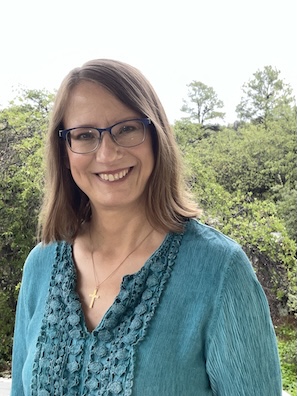From time to time, I run a 6Ws feature to give fellow authors and their books a bit of promotion. Michele Pariza Wacek is the next. (With a nod to my former life as a journalist, I opted for the 6Ws of the business: who, what, when, where, why and how, which counts as it ends in W.) I will let her tell you about her writing, including her latest release, A Mysterious Christmas Collection. The anthology includes a Christmas mystery from each of her two cozy series. Michele also shares information about her writing in this post, which is part of the Bittersweet Book Tours.
Who are you?
I’m USA Today Bestselling mystery author Michele Pariza Wacek. My mysteries range from light, funny rom-com cozy mysteries to twisty psych thrillers and everything in between. All my books take place in either Redemption or Riverview, Wisconsin (both fictional towns) and all of my series are connected. (Yes, the psych thrillers and cozy mysteries are intertwined, but the series also stand alone, so, for instance, you can enjoy the cozies without having to read the psych thrillers. Also, pretty much everything I write is clean.
What is your latest book?
A cozy mystery Christmas anthology called A Mysterious Christmas Collection, which included a Christmas mystery from each of my two cozy series. The mysteries are loosely connected and the characters make a cross-over appearance in the other story.
When did you begin writing?
The moment I learned to read. I taught myself to read at three years old because I wanted to write stories so badly. Before I could read, I would draw little pictures to help prompt me to verbally tell my stories to my parents. But the problem was the prompts weren’t specific enough, so the story would change each time I told it. This was very frustrating to me, so I decided I needed to learn to read so I could write them down.
How do you write?
Mostly by the seat of my pants (also known as a pantser). That doesn’t mean I don’t have an outline, I do but it’s pretty vague. I mainly have to feel my way through a story.
Where do you write?
Right now at my dining room table. Eventually in my upstairs office. I’m not up there now because my elderly dog can no longer climb stairs and I need to be with her during the day.
Why do you write?
It’s who I am. I’m a writer. Even when I wasn’t writing fiction books, I was still writing, whether it was writing promotional copy, nonfiction books, press releases or other types of nonfiction. I spent over twenty years building a successful copywriting and marketing company before focusing more on my fiction books. It’s just how I’m built.
BLURB
A Charlie Kingsley/Redemption Detective Agency Crossover Christmas Cozy Mystery Anthology! Also include recipes!
In this charming Christmas cozy mystery collection, you get not one but TWO Christmas mysteries — one from the Charlie Kingsley Mystery series (Secret Santa Murder) and one from The Redemption Detective Agency (The Mysterious Case of the Dead Elf).
Even better, the characters in both series will make a crossover appearance in the other mystery.
Here’s a peek at each story:
Secret Santa Murder: A Secret Santa party goes off the rails when a guest is murdered after opening their gift. Can Charlie get to the bottom of who did it in this locked door mystery?
The Mysterious Case of the Dead Elf: Emily and the gang take on a case to help a young mother get over her childhood Christmas trauma. Can they go back in time and solve the mystery of a dead elf to save Christmas before it’s too late?
Includes TWO Christmas cookie family recipes!
LINKS TO BUY
WEBSITE AND SOCIAL MEDIA LINKS
Amazon author page: https://www.amazon.com/author/michelepw
Goodreads: https://www.goodreads.com/michelepw
Facebook: https://facebook.com/michelepwauthor
Instagram: https://instagram.com/themichelepw
YouTube: https://www.youtube.com/@MichelePW

